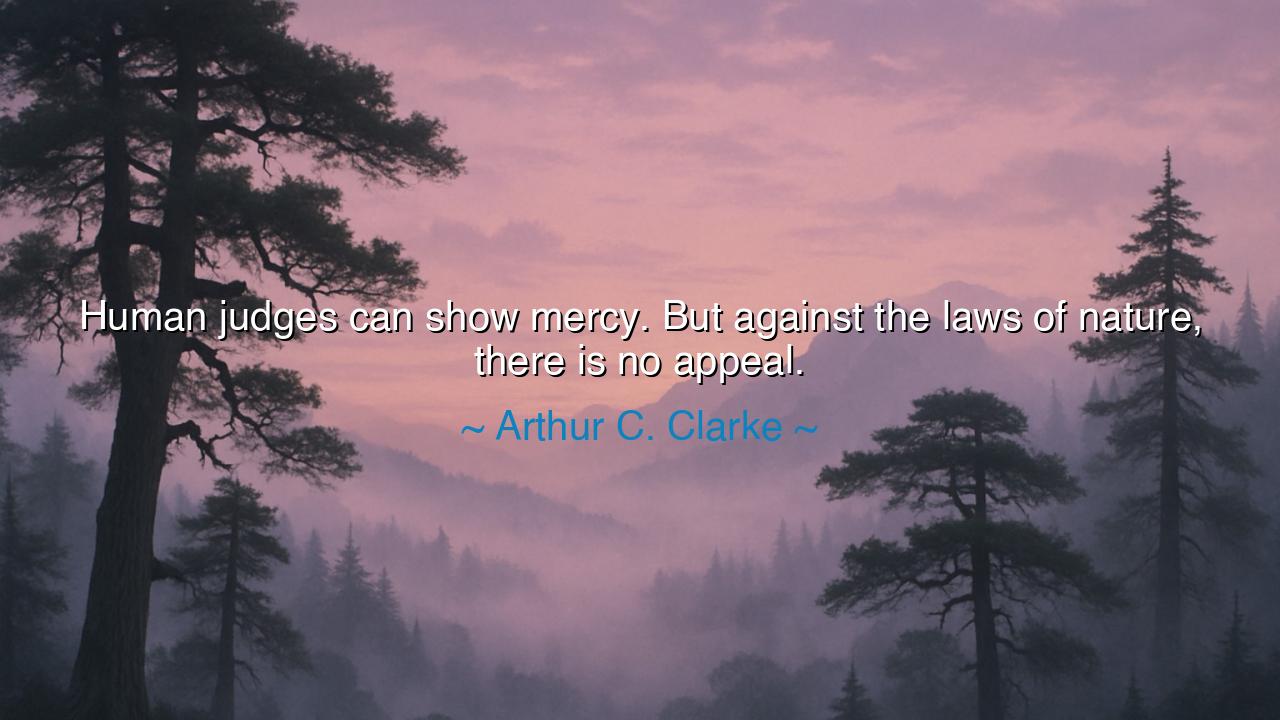
Human judges can show mercy. But against the laws of nature






Arthur C. Clarke once wrote: “Human judges can show mercy. But against the laws of nature, there is no appeal.” In this powerful declaration lies the reminder that while men may temper justice with compassion, the universe itself remains unbending. The court of man is governed by choice and conscience, but the court of nature is governed by necessity. Gravity will not forgive, the storm will not yield, disease will not excuse. The stars and the seas obey only their own laws, indifferent to our pleas. Clarke, a visionary of both science and imagination, speaks here with the voice of one who has studied both man and cosmos, and found their judgments utterly different.
The origin of this thought rests in Clarke’s lifelong fascination with science, exploration, and the eternal patterns that govern the universe. He saw clearly that human beings often live as though their desires or entreaties might bend reality, yet nature is implacable. You may beg the flood to stop, but the waters will rise. You may deny the fire its hunger, but it will consume. Unlike human judges, who can be moved by tears or by conscience, the natural order carries no sympathy. Its laws are eternal, written in forces older than mankind itself.
The ancients understood this truth in their own language. The Greeks spoke of Ananke, the goddess of necessity, before whom even the gods must bow. The Romans built their civilization on the principle that the river, the mountain, the harvest—all followed rhythms beyond human decree. In every tradition we find the recognition that nature’s law is higher than human law, and that to break it is to face consequences without pardon. Clarke, in the age of rockets and machines, reminds us of the same lesson the ancients knew beneath the stars.
History itself provides sobering examples. The Titanic, hailed as “unsinkable,” set forth across the Atlantic with confidence in man’s engineering. Yet when it struck ice, no wealth, no plea, no rank could alter the law of nature: steel cannot float when torn asunder, and freezing seas kill without mercy. The judges of man might pardon an error of pride, but the ocean gave no appeal. Or think of the eruption of Mount Vesuvius, which buried Pompeii in ash. The citizens may have prayed, but their prayers could not undo the force of molten earth. In both tragedies, Clarke’s words find grim confirmation.
The meaning of this wisdom is both humbling and empowering. It humbles us because it reminds us that no amount of wealth, power, or influence can overturn the laws of nature. The greatest king and the poorest laborer are equal before the sea, the storm, and the grave. Yet it empowers us because it teaches that our safety, our progress, our survival lie in understanding these laws and living in harmony with them. While human judges may be swayed by passion, nature is swayed only by truth. To know its truth is to find strength; to ignore it is to invite destruction.
The lesson for us is clear: live with reverence for the laws of nature. Do not imagine that ignorance or arrogance will protect you. Study the world, learn its patterns, honor its limits. Build not in defiance of rivers, but in respect of their floods. Treat not the body as if it can be abused without consequence, but care for it as a vessel bound by natural law. Above all, recognize that while mercy may save you in human courts, wisdom is the only mercy you will find in the courts of the universe.
In practice, this means cultivating knowledge, discipline, and humility. Learn science, for it reveals the structure of nature’s laws. Walk in nature, for it reminds you of your place within a larger order. Accept consequences, not with bitterness, but with the resolve to align yourself more closely with truth. Do not pray for fire not to burn, but learn how to master its power without being consumed. In doing so, you honor both life and creation.
Therefore, remember Clarke’s words: “Human judges can show mercy. But against the laws of nature, there is no appeal.” Take them as both warning and guidance. For the universe is vast and indifferent, but it is also reliable and just in its own way. If you align yourself with its laws, you will prosper; if you defy them, you will perish. Let this truth give you humility before the cosmos and courage in the pursuit of wisdom, for in understanding nature, you discover both your limits and your freedom.






AAdministratorAdministrator
Welcome, honored guests. Please leave a comment, we will respond soon